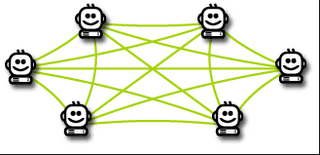P2P
Peer to peer (P2P) software allows the sharing of files between computer users. Files can be shared between users without the hassle of having to email them.One of the earliest P2P file sharing systems was Napster. Users connected to one of a many servers from which they could obtain files, which had been made available by the other users.
The latest generation of P2P "systems" (e.g. Grokster, Streamcast, KaZaA) are far less centralized Napster was. There are no centralized servers; rather users download software (normally free), which effectively turns each user's computer into its own separate Internet server, creating a totally decentralized system.
P2P on Kazaa

Kazaa uses P2Ptechnology. This means that individual users connect to each other directly, without need for a central point of management.
All you need to do is install Kazaa and it will connect you to other Kazaa users.
Overview of the legal issues.
Loosely speaking, you are not infringing copyright by just using P2P software. This is because the software is, in most cases, made available freely by the owners of copyright in circumstances giving rise to an implied license. Of course, if this is not the case then the mere use of the software without license may infringe copyright.
Nor will the use of P2P to share files involve a copyright infringement where the owner of copyright in the material being shared has consented to this.
In our case (me, lecturers and my peers) we may use P2P to share our work (these blogs) in order that others can provide critical comment and evaluation.
It is the use of P2P to share or trade copyright works without the consent or license of the copyright owner that has the potential to give rise to an action for infringement of copyright.
http://www.grokster.com/
http://www.kazaa.com/us/index.htm
http://www.streamcastnetworks.com/FullPress-vs.html
http://en.wikipedia.org/wiki/Grokster
http://en.wikipedia.org/wiki/Peer-to-peer
http://news.bbc.co.uk/1/hi/programmes/click_online/4104827.stm
http://www.bbc.co.uk/imp/
